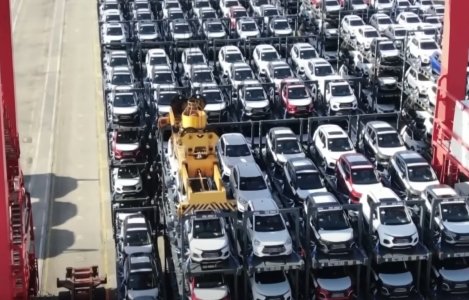Trump’s car tariffs: What you need to know about their impact
By
Veronica E.
- Replies 2
The economy is always evolving, and recently, the Trump administration's decision to impose a 25-percent tariff on auto imports has sparked discussions.
Early signs suggest that this move may be starting to impact the auto industry, with Nissan considering adjusting its production strategy.
But what does this mean for American consumers, and how might it affect the broader economy?
The goal of the tariff is to support the US auto industry by promoting domestic manufacturing and encouraging the purchase of American-made vehicles.
The White House suggests that imports have contributed to challenges in the US auto sector and have affected the country’s supply chains.
While these changes aim to benefit the US economy, experts caution that car prices may increase due to the tariffs, which could impact consumers.

The Nissan Shift
Nissan is reportedly considering shifting some of its production to the US for vehicles like the Rogue SUV, which could be a direct result of the tariffs.
While this decision isn’t final, it suggests that the tariffs are influencing how companies approach production.
In 2024, Nissan sold nearly 920,000 vehicles in the US, and a portion of these were imported from Japan.
As the tariffs on imported vehicles and parts are set to increase, this situation may continue to evolve.
Currently, about 25 percent of the Rogue SUV is made in the US, with 40 percent coming from Japan.
In response to the new policies, Nissan has paused orders for certain SUV models produced in Mexico, signaling a shift in strategy in response to the tariffs.
The Bigger Picture
The response to the tariffs has varied.
Texas Republican Representative Wesley Hunt stated that the tariffs "will restore automotive manufacturing to America."
Last month, the White House emphasized that the US auto industry "has been weakened by an influx of imports that pose a threat to the nation's domestic industrial base and supply chains."
However, others, such as British carmaker Jaguar Land Rover, have announced a pause in US shipments as they reassess their strategies in light of the new tariffs.
What’s Next?
The long-term effects of these tariffs on the global automotive industry are still unclear.
Many factors—such as consumer behavior, company strategies, and international trade relations—are at play.
For American seniors who have witnessed the changes in the nation’s industrial landscape, these developments may bring both challenges and opportunities.
As the situation unfolds, it’s important to stay informed and consider how these policies might affect you.
Whether you're in the market for a new vehicle or simply following the changes in the economy, the impact of these tariffs could reach far beyond the auto industry.

What are your thoughts on the recent car tariffs? Do you think they will help the US economy and workforce, or are you concerned about the potential for higher costs? Have you experienced any changes in the auto industry that have affected you or someone you know? We invite you to share your thoughts and experiences in the comments below!
Early signs suggest that this move may be starting to impact the auto industry, with Nissan considering adjusting its production strategy.
But what does this mean for American consumers, and how might it affect the broader economy?
The goal of the tariff is to support the US auto industry by promoting domestic manufacturing and encouraging the purchase of American-made vehicles.
The White House suggests that imports have contributed to challenges in the US auto sector and have affected the country’s supply chains.
While these changes aim to benefit the US economy, experts caution that car prices may increase due to the tariffs, which could impact consumers.

US auto manufacturing could see significant changes as tariffs influence production strategies and pricing. Image Source: YouTube / CNBC.
The Nissan Shift
Nissan is reportedly considering shifting some of its production to the US for vehicles like the Rogue SUV, which could be a direct result of the tariffs.
While this decision isn’t final, it suggests that the tariffs are influencing how companies approach production.
In 2024, Nissan sold nearly 920,000 vehicles in the US, and a portion of these were imported from Japan.
As the tariffs on imported vehicles and parts are set to increase, this situation may continue to evolve.
Currently, about 25 percent of the Rogue SUV is made in the US, with 40 percent coming from Japan.
In response to the new policies, Nissan has paused orders for certain SUV models produced in Mexico, signaling a shift in strategy in response to the tariffs.
The Bigger Picture
The response to the tariffs has varied.
Texas Republican Representative Wesley Hunt stated that the tariffs "will restore automotive manufacturing to America."
Last month, the White House emphasized that the US auto industry "has been weakened by an influx of imports that pose a threat to the nation's domestic industrial base and supply chains."
However, others, such as British carmaker Jaguar Land Rover, have announced a pause in US shipments as they reassess their strategies in light of the new tariffs.
What’s Next?
The long-term effects of these tariffs on the global automotive industry are still unclear.
Many factors—such as consumer behavior, company strategies, and international trade relations—are at play.
For American seniors who have witnessed the changes in the nation’s industrial landscape, these developments may bring both challenges and opportunities.
As the situation unfolds, it’s important to stay informed and consider how these policies might affect you.
Whether you're in the market for a new vehicle or simply following the changes in the economy, the impact of these tariffs could reach far beyond the auto industry.
Key Takeaways
- President Donald Trump's auto tariffs are potentially influencing major car manufacturers like Nissan to consider relocating some of their production to the United States.
- The White House introduced a 25 percent tariff on auto imports as part of broader efforts to boost domestic manufacturing and the economy.
- While the tariffs could lead to higher car prices for consumers, the Trump administration believes they will help revive America's automobile industry and strengthen its supply chains.
- The long-term effects of these tariffs on the global automobile industry and supply chains have yet to be fully understood.
What are your thoughts on the recent car tariffs? Do you think they will help the US economy and workforce, or are you concerned about the potential for higher costs? Have you experienced any changes in the auto industry that have affected you or someone you know? We invite you to share your thoughts and experiences in the comments below!






